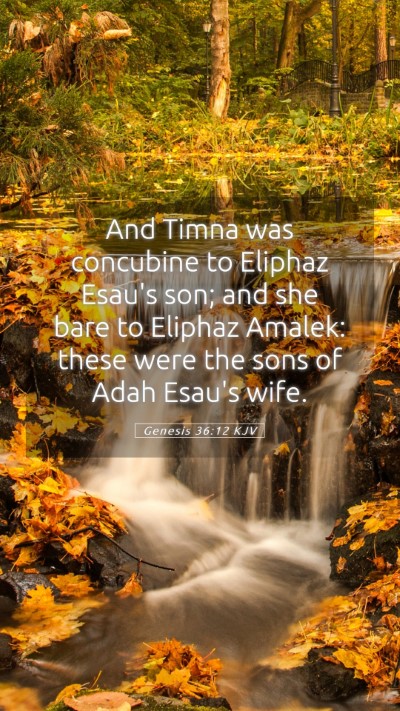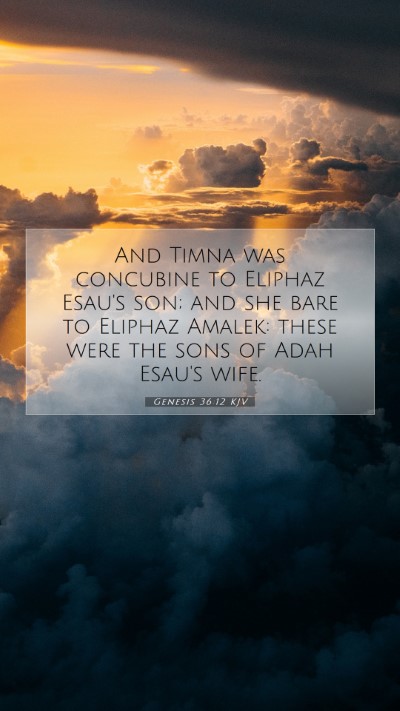Understanding Genesis 36:12
Verse: Genesis 36:12 - "And Timna was a concubine to Eliphaz, Esau's son; and she bare to Eliphaz Amalek: this is the father of the Amalekites."
Overview: In this verse, we encounter Timna, a woman linked to Eliphaz, the son of Esau. The mention of their offspring, Amalek, is significant as it ties into the lineage of the Amalekites, a people who would later become antagonists of Israel.
Meaning and Significance
The verse epitomizes the intertwining of family lineage and national identity in biblical narratives. Here are some insights drawn from public domain commentaries:
-
Matthew Henry:
Henry explains that this verse demonstrates the complexities of family and marriage customs in biblical times. Esau's lineage, through Eliphaz and Timna, introduces Amalek, suggesting the conflict that would arise between the descendants of Jacob and Esau. The Amalekites would embody opposition to the Israelites, representing moral and spiritual challenges throughout Scripture.
-
Albert Barnes:
Barnes points out that the term "concubine" reflects a historical practice where women held secondary status but were culturally significant in family lineage. The birth of Amalek is pivotal as it foreshadows the enmity between the Amalekites and the Israelites, offering profound insight into God’s unfolding plan. This verse is not only about genealogy but also about the ongoing struggle between God’s chosen people and those aligned against them.
-
Adam Clarke:
Clarke elaborates that the naming of Amalek as the father of the Amalekites serves as a narrative device to alert readers to the impending trials Israel would face from this tribe. Amalek's bloodline signifies the interruption in the promise of peace that God had intended for His people, underscoring the reality of spiritual warfare faced by the descendants of Jacob.
Biblical Exegesis and Interpretation
The understanding of Genesis 36:12 extends into broader biblical exegesis, where the implications of lineage are critically examined:
-
Historical Context:
This verse not only provides genealogical data but serves as an indicator of societal structures during the times of the patriarchs. The reference to a concubine indicates polygamous practices, which were prevalent among those of significant status. The historical conflicts involving the Amalekites illustrate continuous themes of conflict and resolution in the biblical narrative.
-
Theological Implications:
This passage invites theological reflection on God's sovereignty in the affairs of humanity. The choice of individuals in the genealogy links directly to God's covenant with Abraham, illustrating how divine plans incorporate human choices and cultural contexts.
Applications in Daily Life
Understanding such verses enhances our application of Scripture:
-
Personal Reflection:
Readers are encouraged to reflect on their identities and how family ties can impact broader life narratives. Just as Amalek is part of a larger story, every individual plays a unique role in the context of God's creation.
-
Spiritual Warfare:
This verse acts as a reminder of spiritual battles faced by believers today. Like the Israelites, who contended with Amalek, Christians are called to navigate spiritual challenges and ensure they uphold their covenant with God against worldly opposition.
Additional Biblical Cross References
- Exodus 17:8-16 - The battle against Amalek.
- Deuteronomy 25:17-19 - Remembering what Amalek did to Israel.
- 1 Samuel 15:2-3 - Saul’s commission to destroy the Amalekites.
Conclusion: Genesis 36:12 encapsulates crucial themes of lineage, conflict, and the overarching narrative of divine sovereignty in human history. Through careful study and understanding of this verse, one gains insights into the complexities of biblical relationships and the implications of familial ties in God's redemptive plan.
This analysis serves as a valuable resource for anyone engaged in Bible study groups, navigating online Bible study platforms, or seeking structured Bible study guides.


